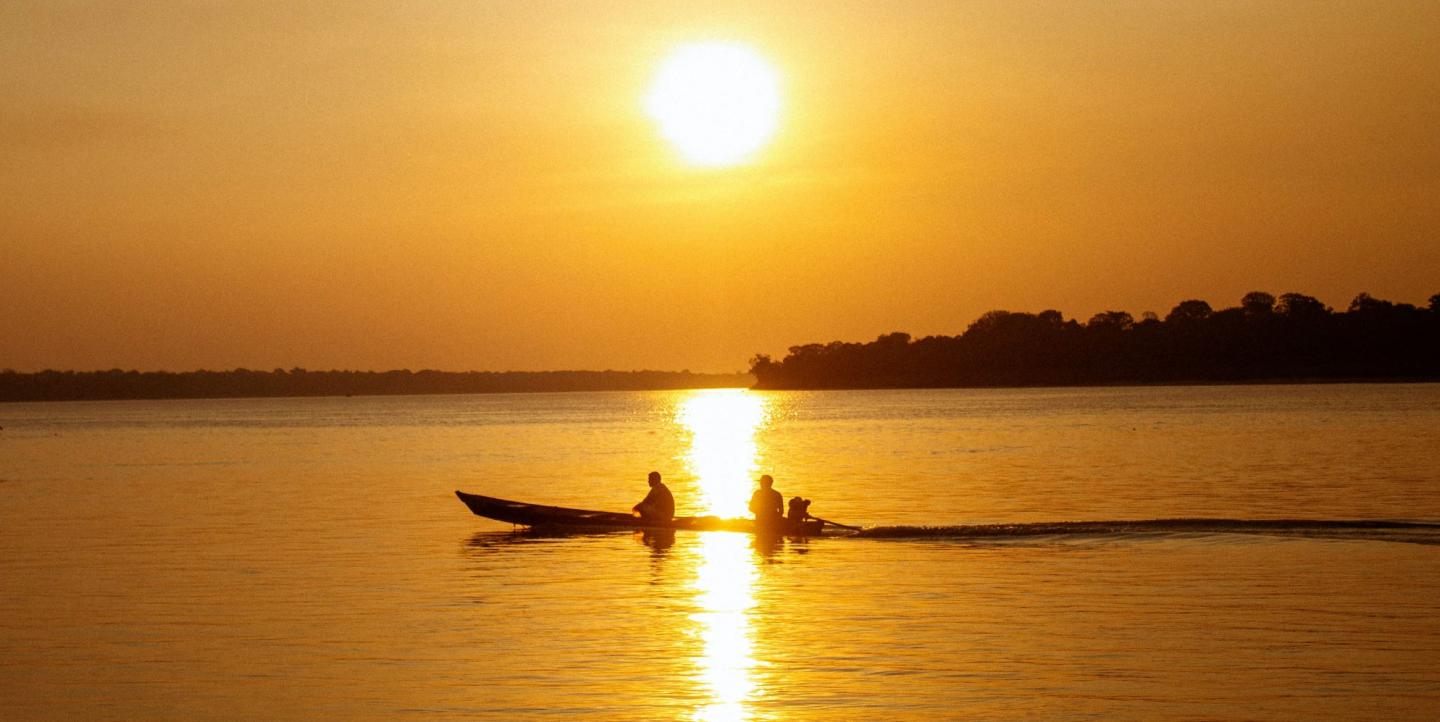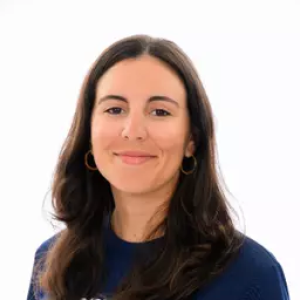Women who live in riverside communities in the Amazon often contend with challenges that prevent them from accessing critical prenatal care, from low tide levels to long, costly journeys. But in the Brazilian state of Pará, in a riverside city of 72 islands, the rate of pregnant women accessing treatment has improved. How?
A reporting series from Amazônia Vox, a news outlet founded by ICFJ Knight Fellow Daniel Nardin, explored this question, shining a light on the impact of the city’s floating medical clinic.
“Yes, the region has many problems, but it also has many local initiatives led by people from the land who strive to find solutions,” said Nardin, a journalist from Pará. “I wanted to – through the lens of ‘solutions journalism’ and the approach we adopt at Amazônia Vox – point to possible paths and examples, even though they might have challenges and limitations.”
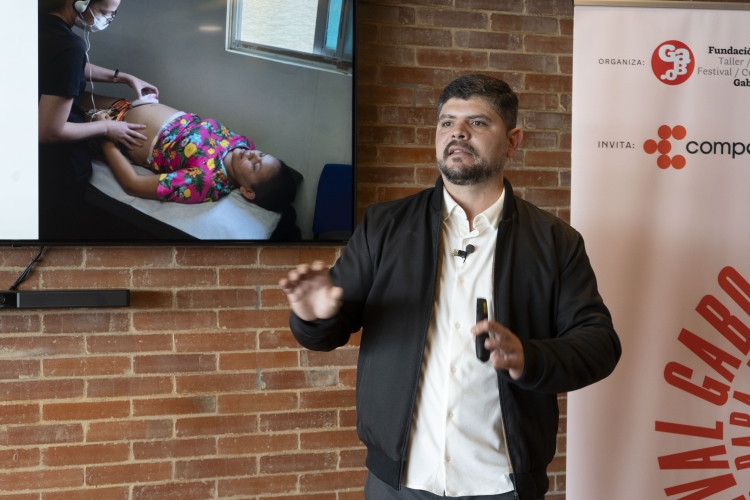
ICFJ Knight Fellow Daniel Nardin speaks about Amazônia Vox's reporting series on prenatal care.
After the series and mini documentary were published, a representative in the Legislative Assembly of the State of Pará introduced a bill that could lead to greater funding for prenatal care for riverside women, directly citing the reporting. The bill is still awaiting a vote by the Health Committee, which is expected to happen this year. On the federal level, a public hearing on the issue is now scheduled in Brazil’s Federal Chamber of Deputies.
Uncovering disparities, highlighting progress
Nardin founded Amazônia Vox in 2023. The news outlet is dedicated to amplifying Amazonian voices and issues, as well as potential solutions to the problems in the region.
The report began when Nardin won grants from the Early Childhood Reporting Fellowship program, promoted in Brazil by the Fundação Maria Cecília Souto Vidigal and the Dart Center, from Columbia University. Nardin and his team began to look for areas of need. They specifically wanted to address a challenging topic as well as a topic with solutions, and prenatal care for riverside women in the Pará region stood out.
“I checked the official data from the Ministry of Health,” Nardin said. “From there, by analyzing the numbers, I sought the ‘positive deviance.’ In other words, even among municipalities with low or below-average [prenatal care] coverage, I looked for those with a growing trend over the years – indicating some work that was being done and could be investigated.”
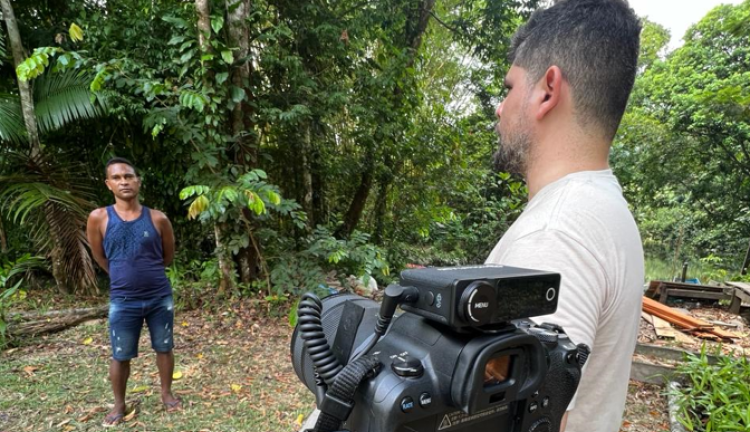
Nardin interviews a source for Amazônia Vox's prenatal care series.
Women in the Amazon have the lowest access to prenatal care in Brazil. Using the indicator of adequate prenatal care coverage, Nardin found that “of the hundred Brazilian municipalities with the lowest percentage in this indicator, 95 are in states of the Brazilian Legal Amazon.” Only 55% of women in the Amazon region receive adequate prenatal care in contrast to the national Brazilian average of 74%.
In the city of Abaetetuba, in the state of Pará, the indicators remain below the national averages but have improved over the years, as work is being done to help. A basic river health unit, or floating medical clinic, has greatly aided mothers and children in the area, as Nardin’s report demonstrates through data reporting as well as testimonials from mothers and health workers. The clinic is one of 56 in operation across Brazil, and offers vaccinations, dental care and more.
“In the past, the riverside people here suffered a lot, especially with health issues…here, mothers considered babies to be something normal, so it was natural for them not to go for checkups and to lose them,” said one local teacher, who has worked as a health agent in Abaetetuba for 12 years and serves 132 families. “With the arrival of the [river health unit], things have improved 100%.”
The Amazônia Vox report highlights the connection between increased prenatal consultations and a reduction in infant and maternal mortality. It delves deep into the current state of prenatal care, the realities of women living there, and the change that is needed.
Nardin’s team spent two days aboard the boat, observing the work and listening to patients. He said the focus on solutions helped ease the reporting process with local government officials.
“The [municipal] administration did not interfere with the approach, provided the data, and understood that by showing transparency and highlighting the problem alongside the efforts being made, the report could even help garner more support and resources,” he said.
Impacts
In addition to prompting the state bill and federal hearing, the series and the documentary were seen and discussed by thousands across the country. The report also was recognized within Brazil and internationally.
In December, Amazônia Vox received the Paulo Frota Human Rights Medal at the State Legislative Assembly, for their report’s focus on the human rights of the riverside mothers. It also won the Roche Prize in the digital journalism category. This win was the first for an outlet from Brazil’s Legal Amazon, and won against 458 other entries for its “high narrative quality” and “exhaustive analysis of the gaps and challenges of prenatal health coverage in the Brazilian Amazon.”
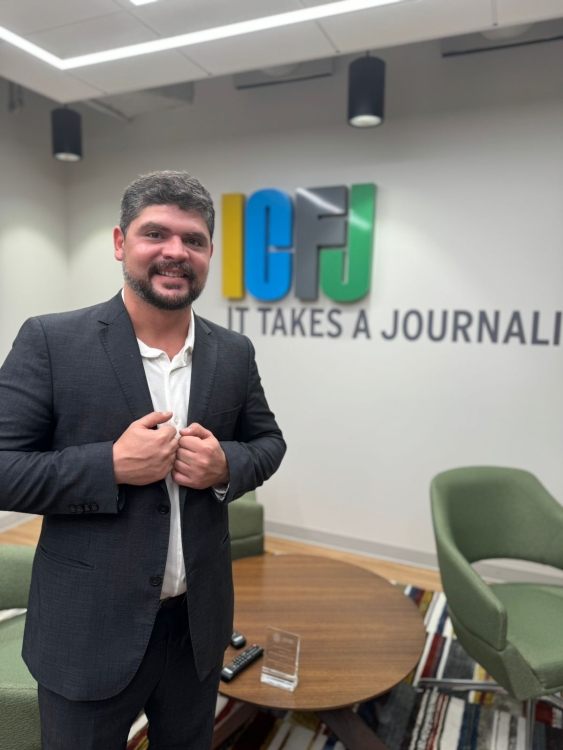
In his Knight fellowship with ICFJ, Nardin will focus on implementing the English version of content and tools on Amazônia Vox, growing the reach of the platform, and increasing collaboration between international media organizations and local journalists. Another goal of great importance to him is to prepare training opportunities for journalists in the Amazon, as the 2025 UN Climate Change Conference will be hosted in Belém, where Nardin lives and works. In line with his aim to support stories about the Amazon by Amazonians, Nardin is working to develop a bank of local photographers and filmmakers, to amplify their voices while generating income and opportunities for the region.
Nardin believes that the support he received from ICFJ, through his ICFJ Knight Fellowship, significantly improved the visibility of the report as well as the credibility of himself and Amazônia Vox as an outlet.
“I am confident that with ICFJ, we can do much more with journalism that puts people at the center, highlights problems while also pointing to solutions, and tells the story of the Amazon from within,” Nardin said. “This significantly contributes to breaking stereotypes about the region, promoting knowledge, and supporting Amazonian communities through journalism.”
This article was originally published by IJNet's parent organization, ICFJ.
Photo by Bruna Leite on Unsplash.

